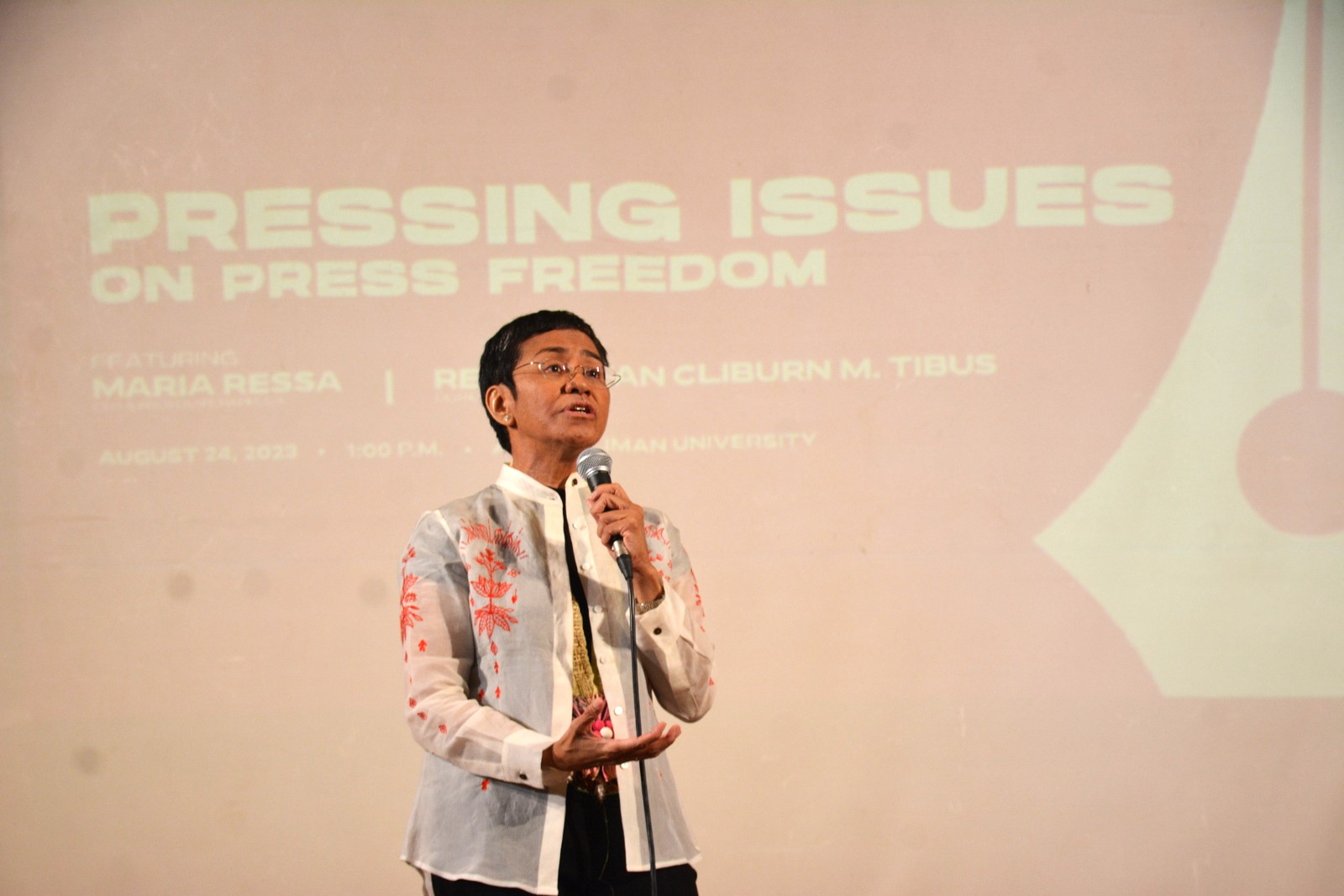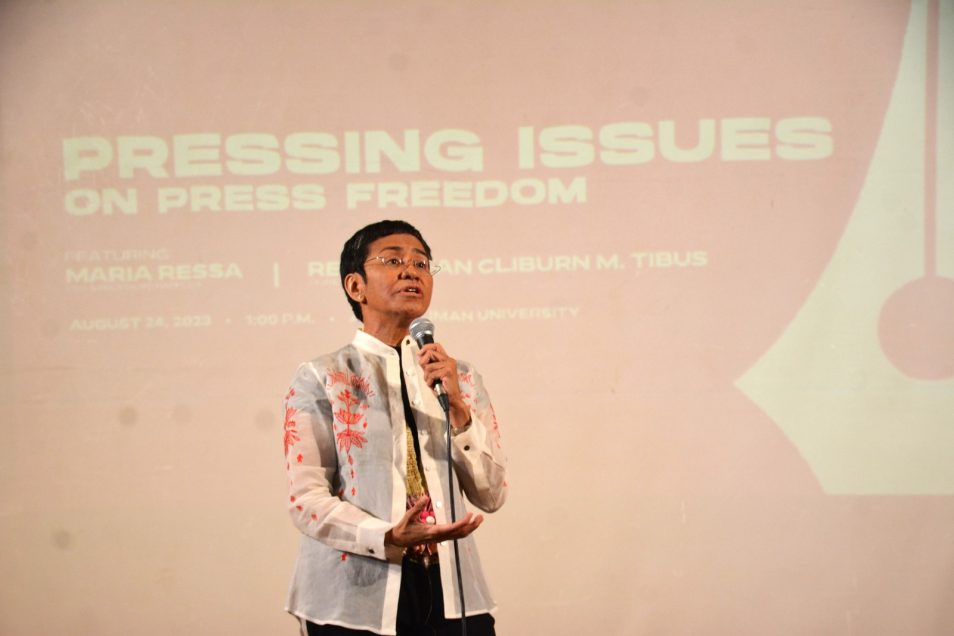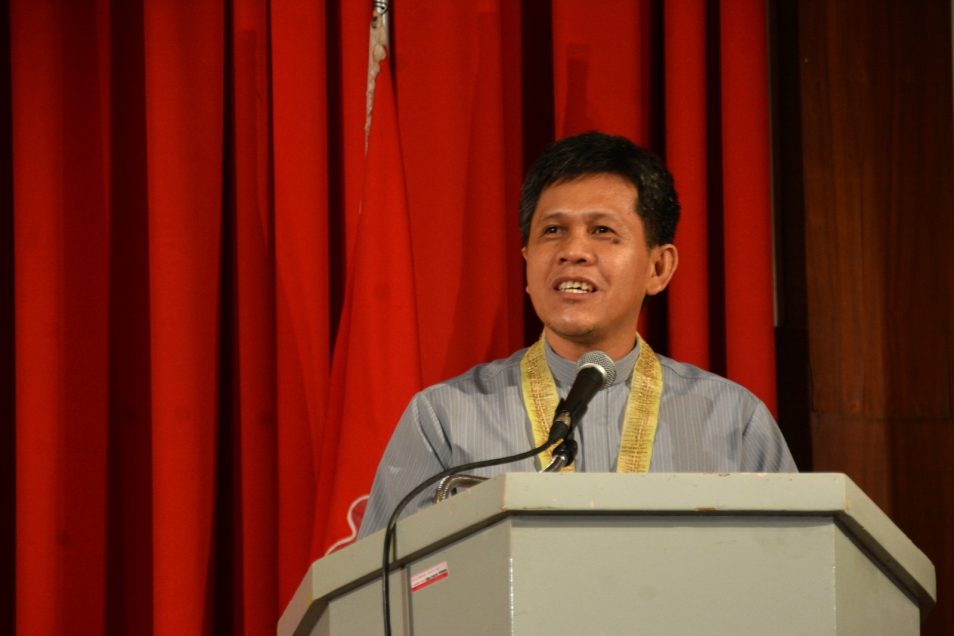
Nobel Prize laureate: Fighting dictatorship starts with personal values

Dr. Maria A. Ressa, 2021 Nobel Peace Prize laureate
Dr. Maria A. Ressa, 2021 Nobel Peace Prize laureate, emphasized in her talk at Silliman University (SU) last August 24, 2023 that sticking to one’s values is critical in standing up against abuse of power.
The veteran journalist and Rappler CEO served as the guest speaker in a liturgical service and symposium, titled “Pressing Issues on Press Freedom,” held at the SU Audio Visual Theater 1.
Ressa centered her talk around her third and latest book, “How to Stand Up to a Dictator: The Fight for Our Future,” which was also launched after the event.
In her book, Ressa shared her experiences and insights on speaking truth to power, attacks on press freedom and democracy, and the rise of authoritarianism in the Philippines and around the world with the aid of social media companies.
“A lot of unforgettable, unconstitutional things happened and yet we keep going. They get normalized. We need to stand for the substance of rule of law…it goes down to these values that we have. That is the critical part,” said Ressa.
According to the Nobel Prize website, Ressa was recognized for “efforts to safeguard freedom of expression, which is a precondition for democracy and lasting peace.”
The Nobel Prize committee also recognized Ressa’s work on exposing “the abuse of power, use of violence and increasing authoritarianism of the regime of President Rodrigo Duterte”; Duterte’s “controversial, murderous anti-drug campaign”; and Rappler’s documentation on “how social media are being used to spread fake news, harass opponents and manipulate public discourse.”
Ressa was awarded the 2021 Nobel Peace Prize with Russian journalist Dmitry Muratov.
Values
Standing up to a dictator, said Ressa, starts with one’s values and being honest in one’s personal, daily decisions.
“How can you speak truth if you’re not honest to yourself?” said Ressa.
Ressa shared lessons she learned from her life, including drawing the line between good and bad behavior and having an honor code.
Drawing the line, explained Ressa, means having a clear definition of good and bad behavior.
“On this side, you’re good. [If] you cross the line, you’re evil. It has to be that clear. We have such a fantastic way of rationalizing bad behavior,” she said.
To further her point, Ressa used corruption as an example and said that the Philippines became “endemically corrupt” because “corrupt people justified it and convinced others to become like them.”
“It is far tougher to say no to corruption but when you say no to corruption, and do it the first time, you’re set on your path,” she added.
As for having an honor code, Ressa said: “There are studies that actually show that people behave better when they have a code, and for me, it was the honor code of the university I went to…it says that not only have you not cheated, you pledge not to cheat, but that you also pledge to turn in anyone around you you see cheating.”
Being honest in one’s personal life, she added, is the foundation of being a journalist and those in the business of journalism because their job entails being honest to people in power.
“Part of the reason that we (Rappler) stayed the course through the six years of Duterte, despite what our lawyers told us…was that we couldn’t look ourselves in the mirror, eh. When you’re on the frontline, if you give up, you give ground. And this leads to another critical lesson: you not only draw the line, you hold the line. The more of us who hold the line, the stronger we all get. The stronger the good gets,” said Ressa.
Ressa also recalled a time when she refused to be bribed as a journalist.
“That one little choice has set me on this path, where you create your communities, we find like-minded individuals, find your team, and you keep moving and you create bigger and bigger circles of people who say no to corruption, who challenge power, [and] do the right thing,” she added.
Faith and mass media
Ressa said standing up to a dictator requires the knowledge of mass media, the power of journalism to push back against power, and “tremendous faith.”
“The battle begins with you. The way we win the battle begins with you, ‘cause the war isn’t in Ukraine. It’s in your pocket…It starts with your values. It starts with your faith. It starts with the communities you build,” said Ressa.
Before Ressa’s talk, Rev. Dr. Van Cliburn M. Tibus, SU Divinity School dean, delivered a Biblico-theological reflection on the topic of standing up to people in power who commit evil deeds, which he related to the story of the prophet Nathan and King David in the Bible.
“Absolute power corrupts absolutely, and King David succumbed to this; yet no one was there to challenge him at that time, except God…the Lord was displeased by the evil deed that David had done, and so God sent the prophet Nathan to David.”
Moreover, Tibus said: “It must not be easy for the prophet Nathan to confront the king. Credit to David, he acknowledged the evil deed and faced the consequences. How we wish more people in power, confronted by their evil deeds, would do what David did.”
Rev. Alvaro O. Senturias Jr., executive director of The Wednesday Forum, said in his words of welcome that the “search for truth should always be primary and should always take a primordial part of every Christian’s life.”
“Like Maria Ressa’s dream of village building a community of people who are committed to the pursuit of truth, we in the Wednesday Forum, Silliman University, and many other peace-loving peoples of the world should commit ourselves to the continuing search for truth, for peace, and for justice,” added Senturias.
The event was organized by The Wednesday Forum, the Philippine Ecumenical Peace Platform, and the College of Mass Communication and Divinity School of SU as part of the month-long 122nd Founders Day celebration of the University.

Rev. Dr. Van Cliburn M. Tibus, Silliman University Divinity School dean


